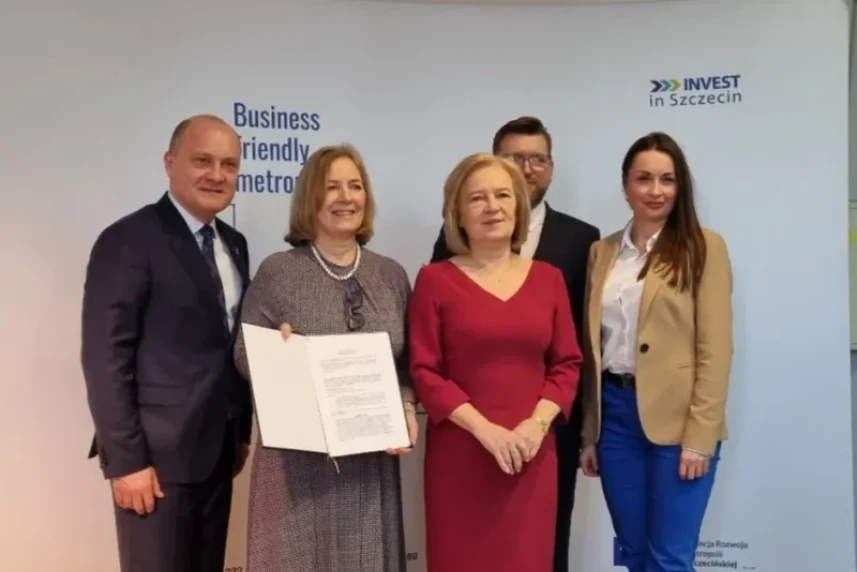Doors to open for a career in offshore
Natalia Mróz

Renewables are experiencing robust growth and offshore wind power will play a key role. In response to a growing need for employees in the offshore wind power (OWP) sector, the Polish Wind Energy Association (PWEA) has partnered with the City of Szczecin to launch an educational project in Szczecin’s secondary schools that will provide students with career prospects in the emerging industry of offshore wind power.
The renewable industry is thriving and there is no turning back for this trend. Wind power is becoming the key driver of Poland’s energy transition. Poland’s energy system will soon rely heavily on offshore wind power. The wind power potential offered by Poland’s part of the Baltic Sea is considered among the highest in Europe, reaching an impressive 33 GW. By tapping into this potential, Poland could meet almost 60% of its electricity demand. This means that in the coming years, Polish offshore power will give the entire Polish economy a significant growth boost. This will, however, require an adequate level of local content. The offshore industry is set to become a steady source of profit for the Polish economy in the decades to come. According to available data, onshore and offshore wind sectors have the potential to provide nearly 200,000 new jobs and over PLN 450 billion of added value for the Polish economy by 2040. The Westpomeranian Voivodeship is well on its way to become an industrial hub in the Baltic Sea region.
The Westpomeranian Voivodeship is becoming a key offshore hub in Poland and a strategic location for wind power generation on the Baltic Sea. The region is not only ramping up its production of renewable power, which Europe still does not have enough of, but also gearing up for the manufacture of components for the sector. What is more, the entire Western Pomerania has a huge potential in terms of operating, installing and servicing wind farms.
The year 2023 was marked by several important investment decisions, as well as new initiatives and projects in the region. Among other projects, Vestas from Denmark is building two plants to manufacture turbine blades and nacelles, and Windar from Spain is setting up its third tower, mast and foundation plant. These three projects alone will add thousands of new jobs in Szczecin. The Spanish company is planning to hire at least 400 people, while the Danish giant aims for a workforce of 700 and over a thousand in its two factories, respectively. More jobs will come as the sector continues to grow, driving demand for well-qualified employees with varying degrees of education.
In response to a growing need for employees in the offshore wind power (OWP) sector, the Polish Wind Energy Association (PWEA) has already partnered with the City of Szczecin to help deliver the future workforce for the sector. They will sign a collaborative agreement to promote offshore wind power education for students of Szczecin’s schools.
“We’re excited to see that our efforts are bringing tangible results as we have signed an agreement with another school in Szczecin. Offshore wind power needs specialists from a range of professions and the Electrical and Electronic Technology Secondary School (TME) is one of Poland’s top technical secondary schools. Our primary task in the nearest future is to educate an adequate workforce for the OWP sector. Since we are largely talking about emerging skills and professions, it is so important to make sure the process is coordinated at multiple levels,” said Mayor of Szczecin Piotr Krzystek.
An important role in educating the offshore workforce is played by the Szczecin Metropolitan Region Development Agency – a municipal company and coordinating entity acting as an intermediary between the Municipality, schools and the Polish Wind Energy Association.
“Poland is now the third-biggest market for wind power in the EU after Denmark and Germany. What is more, we have considerable employee resources to draw on, with Poles currently representing 3 percent of the global offshore workforce. Worth around PLN 40 billion, the Polish offshore wind farm project is well advanced three years after the Offshore Act was signed into law. With Polish and foreign companies on board, the offshore campaign has already brought to fruition over ten flagship projects. This means new well-paid jobs and enormous prospects for young people entering this market. Hence, PWEA and City of Szczecin have come up with their educational project to help prepare young people for this promising new career path,” said Janusz Gajowiecki, President of the Polish Wind Energy Association.
The project is already underway! An educational project has been launched in Szczecin’s schools to improve students’ knowledge in the area of offshore wind power and promote their occupational competencies required to work in the wind power sector. The project will see selected schools in Szczecin – including Maria Skłodowska-Curie General Secondary School No. 1, the Maksymilian Tytus Huber Electrical and Electronic Technology Secondary School and the Westpomeranian Centre for Marine and Polytechnical Education – host recurring workshops provided by offshore wind power experts and organise study visits at offshore companies. The workshops will be provided by offshore wind power experts.